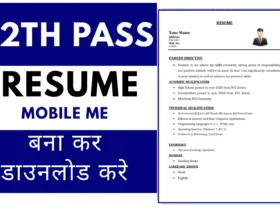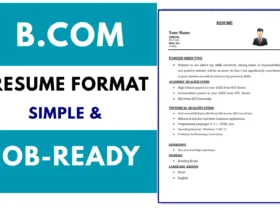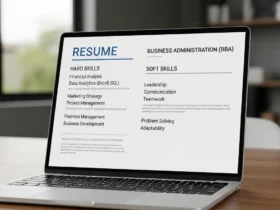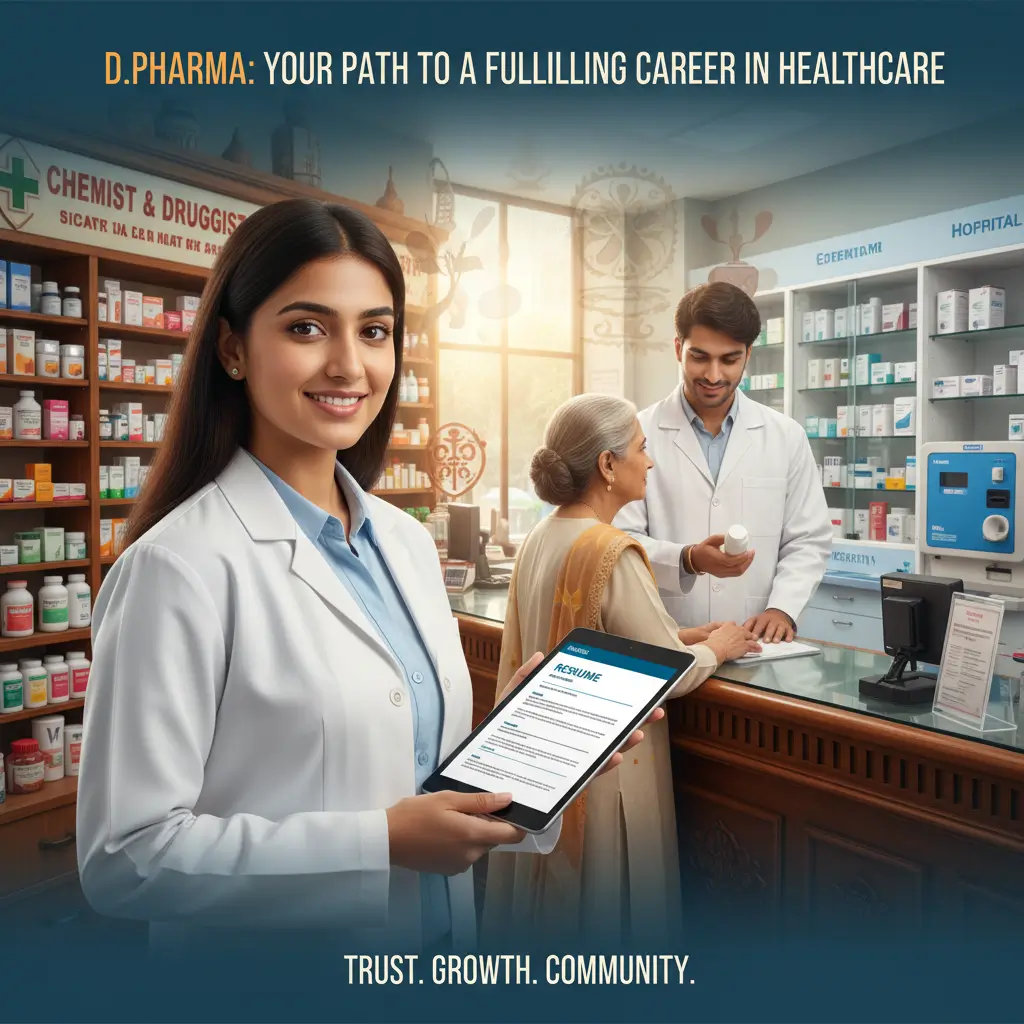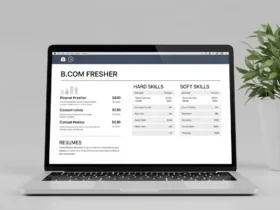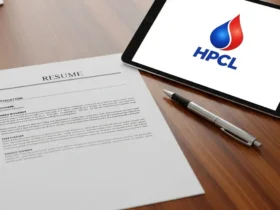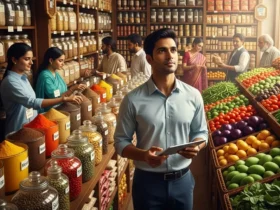Choosing what to do after 12th grade is a big deal in India, right? With so many options, finding a path that fits your interests and offers good prospects is a key step. If you like science, helping people, and are curious about medicines, then a D.Pharma (Diploma in Pharmacy) might be a good fit. This blog post will walk you through what D.Pharma is all about, from how to put together a great resume that gets noticed, to the kinds of jobs you can aim for here in India, and what the future of this field looks like. Let’s explore this world together!
A D.Pharma is a two-year course that gives you a good start in the world of medicines. Think of it as your entry ticket to help people with their health. After your studies, you also do a three-month training period. This part is like an internship, where you get hands-on experience in a real setting, maybe a hospital pharmacy or a local medical store.
This degree lets you work in different places, like your neighborhood chemist shop, big city hospitals, or even medicine-making companies. It prepares you to handle medicines safely, talk to patients, and keep things running smoothly in a pharmacy.
Here in India, you often see local ‘chemist shops’ in every lane and corner. D.Pharma graduates are often the people behind the counter, making sure everyone gets their medicines correctly. They are like the helpers of medicine access in our neighborhoods. Also, in smaller towns and villages across India, pharmacists at public health centers are often trusted sources of health information, much like an elder in the family would give advice. They play a big part in serving the health needs of the community.
Sample D Pharma Resume Format (Easy to Copy)
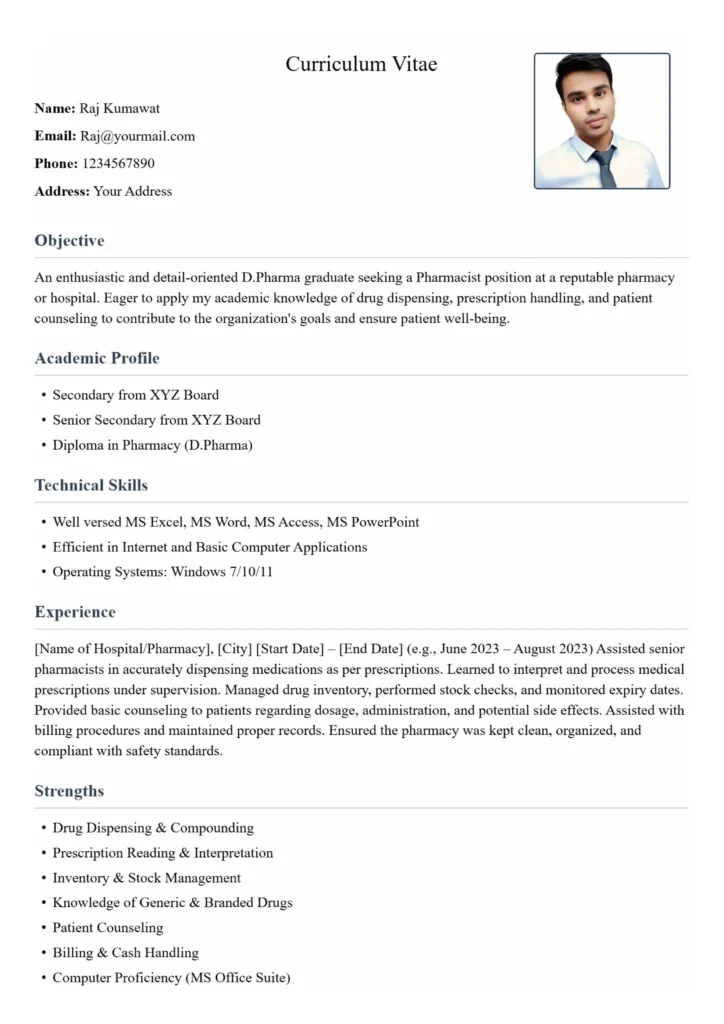
👉 Download Link: [Get Here]
You can:
- Fill it in Adobe or any PDF app
- Print it on clean A4 paper
Historical Perspective
Pharmacy in India has a long story. Many years ago, before modern hospitals and big medicine companies, traditional healers and local herbalists played a big part. Think of the ancient systems like Ayurveda and Unani, where people prepared plant-based medicines to help others. This shows a long tradition of mixing and understanding how natural things can heal.
The idea of formal medicine study began slowly, with some early training for people who prepared medicines. In the 1860s, a school in Madras started teaching how to mix and give out medicines. Later, around 1937, a two-year diploma for ‘Chemists and Druggists’ began. A very big step happened in 1948 when the “Pharmacy Act” came into being. This law made sure that only trained people could work with medicines. It also set up the Pharmacy Council of India (PCI) to make rules for pharmacy learning.
This meant D.Pharma became a recognized way to become a proper medicine expert in India, much like how India built many systems after gaining its independence. This law helped move from old, informal practices to structured, safe ways of handling medicines.
Current Opinions/Trends
Right now, the medicine world in India is growing fast. Our country makes a lot of medicines, and this means more jobs for D.Pharma people. There’s a lot happening:
- More Jobs Everywhere: You can find work in your local pharmacy, big hospitals, or even in companies that make medicines. Jobs as Medical Representatives (MRs) are common, where you talk about new medicines to doctors. Many large Indian pharma companies, like Sun Pharma or Cipla, are big employers, creating many opportunities.
- New Tech: Just like everything else, technology is changing pharmacy. We see more digital tools in health, like online doctor visits (telemedicine) and smart ways to track medicines. This means D.Pharma folks need to be good with computers too. For example, many government efforts are bringing telemedicine to smaller towns and rural areas, and private apps are making it simple to order medicines or talk to a doctor from home. This creates new ways for pharmacists to serve people.
- Bigger Role for Pharmacists: People now look to pharmacists for more than just handing out pills. They expect advice on how to use medicines and stay healthy. In local clinics, pharmacists are often found giving advice on common health issues like fever or cold, much like a family elder would share their wisdom. This shows how their part in healthcare is expanding.
Challenges/Controversies
Even with good chances, D.Pharma grads in India face some hurdles:
- Job Hunt: While there are many jobs, getting one that fits exactly what you studied, especially with good pay, can be a bit tough at first for some. This can be compared to the high competition in India for almost all fields after studies, where many bright young minds seek the same positions.
- What People Think: Some folks still see a pharmacist mostly as someone who gives out medicines, not always knowing the deep knowledge they have about drugs. There can be confusion about the “Doctor” title for Pharm.D grads, which can sometimes affect how all pharmacy pros are seen. This relates to a common societal view in India where an MBBS doctor often receives more public recognition than other health professionals.
- Slower Growth: Compared to fields like engineering, the money and career climb in pharmacy might feel a bit slower for some. However, many Indian families consider stability over quick growth, especially in government or smaller town jobs, seeing it as a fair trade-off.
- Not Enough Clinical Roles: The idea of clinical pharmacists (who work closely with doctors in hospitals on patient care) is still new in many Indian hospitals. This means D.Pharma grads might not always use all their specialized skills.
- Government Delays: Sometimes, state governments take a long time to hire pharmacists for open jobs, leading to temporary roles instead of permanent ones. This can add to uncertainty for job seekers.
Future Outlook
The road ahead for D.Pharma pros in India looks quite bright:
- More Growth: Our country’s medicine making business will keep getting bigger. India is aiming to be a global hub for making medicines. This means more work for people who know about medicines.
- New Skills Needed: With things like AI (Artificial Brain) and digital tools joining medicine, D.Pharma grads will learn new things, like how to handle health info or use special software. This will open up more types of jobs.
- Helpful Rules: The government is helping companies make more ingredients for medicines right here in India, a part of the ‘Make in India’ idea. This will create even more jobs locally, supporting our own country’s economy.
- Broader Roles: Pharmacists will likely play an even bigger part in helping people stay healthy, giving more health advice, and helping manage long-term sicknesses. They can become trusted advisors, helping Indian families manage common health issues like diabetes or high blood pressure.
- Higher Studies: If you want to grow more, you can always do a B.Pharma or a Pharm.D after your diploma. This opens doors to more expert jobs or even teaching. You could also get a business degree for management roles in medicine companies. In India, higher studies are often seen as a way to honor family expectations and climb the career ladder.
Conclusion
So, a D.Pharma can open many doors for you in India’s growing health sector. It gives you a strong start with many job choices, from helping out at your local chemist to working in big hospitals or medicine companies. While there are some difficulties, learning new skills and keeping up with how things change will help you go far. This path offers a chance to help people every day, making a real difference in their lives.
In Indian society, helping one’s community is a respected value, and a pharmacy career lets you do just that. With hard work and a keen mind, your D.Pharma can be the start of a great career, contributing to India’s health future and your own well-being.
FAQs
What is D.Pharma?
D.Pharma is a two-year diploma course in pharmacy. It teaches you about making medicines, how they work, and how to give them to people safely. You also do a three-month practical training.
Do I need to take NEET for D.Pharma admission?
No, the NEET exam is not needed for D.Pharma. Most admissions are based on your 12th-grade science marks or through state-level tests like JEECUP in Uttar Pradesh.
Can I open my own medical store after D.Pharma?
Yes, after getting your D.Pharma and registering with the pharmacy council, you can open your own retail pharmacy shop. This is a common path for D.Pharma graduates in India.
What kinds of jobs can I get with a D.Pharma in India?
You can work as a pharmacist in government or private hospitals, local medical stores, or for medicine companies in their making or sales teams. You can also find jobs in drug control offices.
Is D.Pharma a good career choice for girls in India?
Yes, it is a very good choice. Many girls choose D.Pharma as it offers respected and stable jobs in healthcare, often in clean and safe settings like hospitals or pharmacies, with regular hours.
What if I want to study more after D.Pharma?
You can definitely study more! After D.Pharma, you can join a B.Pharma (Bachelor of Pharmacy) course directly in the second year through a “lateral entry” option. This can open doors to more advanced roles.

